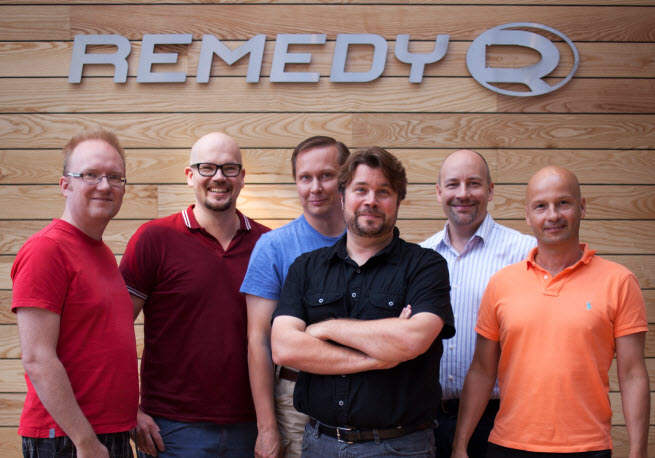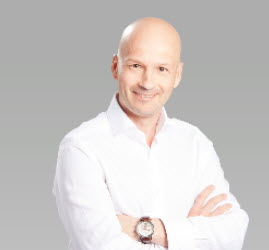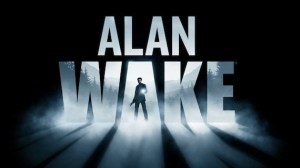Remedy Entertainment, the Finnish developer that brought us titles such as Max Payne and Alan Wake, always shoots high with its narrative-based video games. It is doing so again with its Microsoft Xbox One exclusive game, Quantum Break. But it is also navigating the transition to online and mobile titles. So the company is announcing today that it is adding two new members — Mike Capps, former president of Epic Games, and Christian Fredriksson, chief executive of security firm F-Secure — to Remedy’s board.
Remedy chief executive Matias Myllyrinne said in an interview with GamesBeat that the company wanted to strengthen its board at a time when the game industry is in transition. New consoles are coming, but a lot of the business is shifting to online and mobile games. Remedy has always been a mid-sized game developer with a few dozen employees working on a single major game at a time. But it has quietly expanded to more than a 100 people as it undertakes both a next-generation game and other unannounced work. Myllyrinne said that “the cards are being dealt again,” meaning that the console market is moving into a transition and everything is up for grabs.
Capps says he’s been a fan of Remedy’s games for years and he loves their “commitment to AAA talent and culture.” Though he has retired from an active executive role, he hopes to be a sounding board and advisor for Myllyrinne. Fredrikson said he hopes to contribute advice in running a large business, and he looks forward to Remedy’s next phase in its global growth.
To prepare for that, Myllyrinne is expanding on all fronts. Here’s a transcript of our interview.
GamesBeat: You have two new board members coming. Tell me how this transpired. What’s the reason for it?
 Matias Myllyrinne: As a company, we’re at an interesting stage. The games industry as a whole is going through an interesting stage. We wanted to strengthen our board, to bring in some people we respect and think could contribute to our success.
Matias Myllyrinne: As a company, we’re at an interesting stage. The games industry as a whole is going through an interesting stage. We wanted to strengthen our board, to bring in some people we respect and think could contribute to our success.
A little bit of context — At least from my perspective, the industry is going through an incredible amount of uncertainty and risk, but on the other hand, we’re seeing the cards being dealt again. There are plenty of new opportunities, both from a technological perspective and from a business perspective. For Remedy as a studio, we’re at a stage where we felt it would be beneficial to bring in some more guidance.
We wanted to bring in the skills that would help us and help me drive the company forward. I spoke to Mike. I’ve known Mike for a long time as someone who I respect a lot. His track record speaks for itself. He was very happy to take it on. He knows our track record, but I know he believes we have an even bigger and better future that he wanted to be a part of.
Christian is a well-respected executive here in Finland. He ran Nokia Siemens Networks in Asia for a long time. He has a good background there. He’s been the CEO of F-Secure for about a year and a half now. They do antivirus software. He runs a large, successful company in its field. We wanted to bring Christian on board for the very reason that he’s not involved in the game industry. He may challenge those some of conventions that we take for granted. He’s somebody who can help us build the organization and give us guidance from a company perspective.
Those were the two guys on top of our list. I was humbled that they accepted our invitation to join the board. For me especially, I know that these guys are in high demand. They have loads of other things they could do.
It’s about building a team. Like when you’re building a game development team, you want your board to be a team that has complementary skill sets. You want different perspectives. We have our founders — our founder, Markus, and our lead programmer, Olli — who bring the Remedy culture and make sure that we take that into account. We won’t lose what’s made us special.
We also have Petri Järvilehto, who I worked with on both Max Payne and the beginning of Wake. He went to Rovio to build a little thing called Angry Birds and take that further. When he joined Rovio, they were about 20-30 people there on the games side, and he built it up to about 230 or 240 people in multiple studios. We’re getting a lot of different kinds of input that will help us go forward.
GamesBeat: What about Remedy’s own history here? You’re in the middle of a big console upgrade and doing a big game there, but you also have these parallel migrations going on. There’s the big mobile transition that you and everybody else are dealing with. What makes this interesting timing for your company?
Myllyrinne: I think we’ll look back on this as a time of golden opportunities in the game industry. We’re seeing a lot of different factors come together. On the console side, working with Microsoft on Quantum Break, we’re seeing a convergence of television and interactive entertainment. Linear storytelling and interactive storytelling can be married together without some of the issues of the past. The tools of storytelling have taken leaps forward that allow us to do a lot of things. We can get out of the uncanny valley.
On the other side, we’re seeing brilliant opportunities in the way we consume our media and our entertainment. Thinking of Netflix, HBO, iTunes, Android, XBLA — There are loads of opportunities for us to interact with the audience in different ways. The average play session on an Alan Wake game was anywhere from 60 to 92 minutes. On Death Rally for iOS, the equivalent is three and a half minutes. We’re one of the studios that has been successful in both spaces. It’ll be interesting to see how those start to get closer in the future and where the overlaps are. What kind of content can we create in the digital space? And on the other hand, what are the massive production values and the things we can push forward in the triple-A space with next-generation consoles?
We’re entertaining a wider audience than ever before. That’s very healthy. Also, the industry is shifting, to a large degree, toward a model where a certain size of player can be aggressive and quick, but also have the resources to do quality. Remedy is in that sweet spot where we’re not a huge corporation that has an existing business going. We can be fairly nimble. But we’re larger than two guys in a garage. We have more talent and more technology and resources to deploy, hopefully in a way that means a lot to our audience.
GamesBeat: As I remember, you guys have been pretty small for making console games — 40 or so people while your competition was working with 200 people or more. Do you foresee an expansion happening? I know that Epic went through that transition and grew to hundreds of people. Is that something you have to think about?
Myllyrinne: I don’t think we’re looking at a massive expansion, but to put it into context, while we’ve always been small, small is a relative term. Max Payne shipped with 22 people. Max Payne 2, there were 25 of us. Alan Wake, we peaked at 55 people including contractors and freelancers. Right now we’re at a little more than 100. We’ve about doubled our headcount in the last two years or so. But that’s all been driven by a healthy business. We want to grow in a sustainable way. I don’t see us going into hyper-growth. We want to maintain a certain culture.
We do want to do more, though. We’re doing multiple projects at one time. Even last year, just looking at the games we were able to deliver, we shipped Alan Wake on the PC. We brought American Nightmare to XBLA and PC. Death Rally came out on Android. We were working on Quantum Break. We have a proven ability to punch a little bit above our weight. We have a lot to look forward to and build toward.
GamesBeat: Multiple teams are something that you’re now capable of managing, then.
Myllyrinne: Absolutely. We have a lot of wonderful people. That’s the foundation. You have people you can trust, a senior team you can trust to take that responsibility. More and more, my job and the board’s job is not about creating games. It’s about creating a studio where they can create exceptional games. That’s how we’ll be successful.
My job is still rewarding, but it’s rewarding in a different way. It’s less about creating games, being part of the development process, and more about building a studio and fostering and protecting that creativity.
GamesBeat: I am fascinated with how fast things have grown over in Finland. It can’t have been easy to hire many people in a short time in that kind of fast-growing, startup environment.
Myllyrinne: We’ve been lucky. We get a lot of applications for our positions. A lot of the people who come to work for us want to say with us for a long time. Our games carry a certain seal of quality. That attracts people to come work for us. We have people from multiple countries — three from the Czech Republic, half a dozen from Australia, 10 from the United Kingdom, more from North America.
We’ve always been an international team. We’re predominantly Finnish, but we’ve always thought of ourselves as a team that entertains people around the world. We grew up on the same popular culture — Battlestar Galactica, the A-Team, those cheesy movies and shows. [laughs] There’s a common denominator that’s stronger than nationality.
GamesBeat: It sounds like you still have a strong relationship with Microsoft. It’s interesting that they’ve picked up Nokia there.
Myllyrinne: Yeah. That’s been the news of the week. Those are very big movements for the local landscape. They have a lot of good people there. For Nokia, I tip my hat to them. On a macroeconomic level, I’m sure you could attribute some degree of the success we’re seeing now in the Finnish game sector to Nokia 10 or 15 years ago.
Some of their attempts may have failed, with N-Gage and so forth, but that brought money in to found studios and float studios through difficult times. It brought in talent and a lot of tech R&D – high-quality engineers and great schools. For all their failings, as an economy and as a society Finland has benefited from Nokia. For that, I’m thankful. The games sector would not be where it is if Nokia hadn’t been around.
GamesBeat: So you must have some really bad things to say about the PlayStation 4 and Apple.
Myllyrinne: [laughs] Not really? I love Apple. I love Apple devices. I’m speaking to you on a Macbook Air right now. I don’t treat these things religiously. We’re working on an iOS game right now. We did Death Rally in 2011 and it was number one in 60 countries, so we’ve had success on iOS devices, although that market is booming and expanding into larger spheres than it was a couple of years ago.
For me, at least, I like different kinds of devices and different platforms. I’m a gamer first and foremost. If the PlayStation 4 does well, for a gamer that’s fantastic. It’s great to have multiple consoles out there. It’s good for the ecosystem. Quantum Break is on Xbox One and we believe that it’s a great platform to work with and play games on, but I don’t take a religious view. It’s about the content and about the experience.
GamesBeat: What technology are you paying a great deal of attention to right now? There are things out there like Oculus Rift, like wearables, like the next-generation consoles. What are some of the things that are highest on your radar as far as this collection of new things out there?
Myllyrinne: I guess I can blow our own horn, although there are others attempting it as well. The most interesting for us lately has been creating emotionally engaging characters. We’re able to deliver digital doubles and make sure that every nuance of the actor’s performance is conveyed in an interactive form. That’s exciting for storytelling. It opens up a lot of new ground.
GamesBeat: Is that what you’ve developed in your proprietary engine?
Myllyrinne: Yes. We’ve been working on Northlight now for quite some time. It’s a storytelling technology first and foremost. It has a lot of different components, but that’s the key purpose for us. I think that when you want to convey drama, it comes down to characters. Good stories are built with characters who convey emotion.
On a personal level, I’m interested in connectivity between different kinds of networks. Being able to have different devices connect to each other is very interesting, even if it’s just Facebook integration or something like that, getting these social aspects into games. That’s cool. I’m a sucker for leaderboards and competition and being able to share that. The lower the barrier there for us as game-makers, the better.
GamesBeat: How is Quantum Break coming along?
Myllyrinne: Very nicely. We’re happy and humbled by the response we had at E3, showing that it’s real. Since we’re not a launch title, the priority was on those. But we did have the opportunity to show it in a back room for a day, running in-engine on development hardware. That was important, to prove that it’s not all smoke and mirrors. At least it was important to me, as a matter of principle.
Right now, it’s time for us to hunker down and keep on working on it. We’ll resurface once we have something to show that we think that is interesting and the time is right. It’s better to show what you’ve done as opposed to talking about what you’re going to do. [laughs]
GamesBeat: It sounds like you guys are more optimistic than some other people in the game industry. There’s a state of angst or worry among some people about the transition.
Myllyrinne: I hate to draw poker analogies, but if the cards were already deal — Take it a few years back. Things were pretty stagnant when it came to game developers on the whole. But now the cards are being dealt again. There are new opportunities and new technologies. It’s an awesome time for creatives in this industry, and for independent studios in particular, to go ahead and do wonderful things.
There’s a lot of uncertainty. I understand that. But I’m not terribly concerned. If you create great quality content, your business will succeed. We have more audiences to attract with better technology and tools. The interesting things are what’s going to happen between now and two or three years down the road. That’s where we want to focus as company. We want to think a little longer-term, a little more ambitious, but still grounded in hard work and reality.
I don’t think I was this optimistic a few years ago. Right now, things are clicking into place.
[Pictured at top: Olli Tervo – Lead Programmer, Remedy Entertainment; Matias Myllyrinne – CEO, Remedy Entertainment; Markus Mäki – Founder, Remedy Entertainment; Petri Järvilehto – Remedy Veteran . Ex VP of Games, Rovio Entertainment. Founder, Seriously Digitial Entertainment Inc.; Michael Capps, former president of Epic games; and Christian Fredrikson – CEO, F-secure Corporation.]
VentureBeat's mission is to be a digital town square for technical decision-makers to gain knowledge about transformative enterprise technology and transact. Learn More






